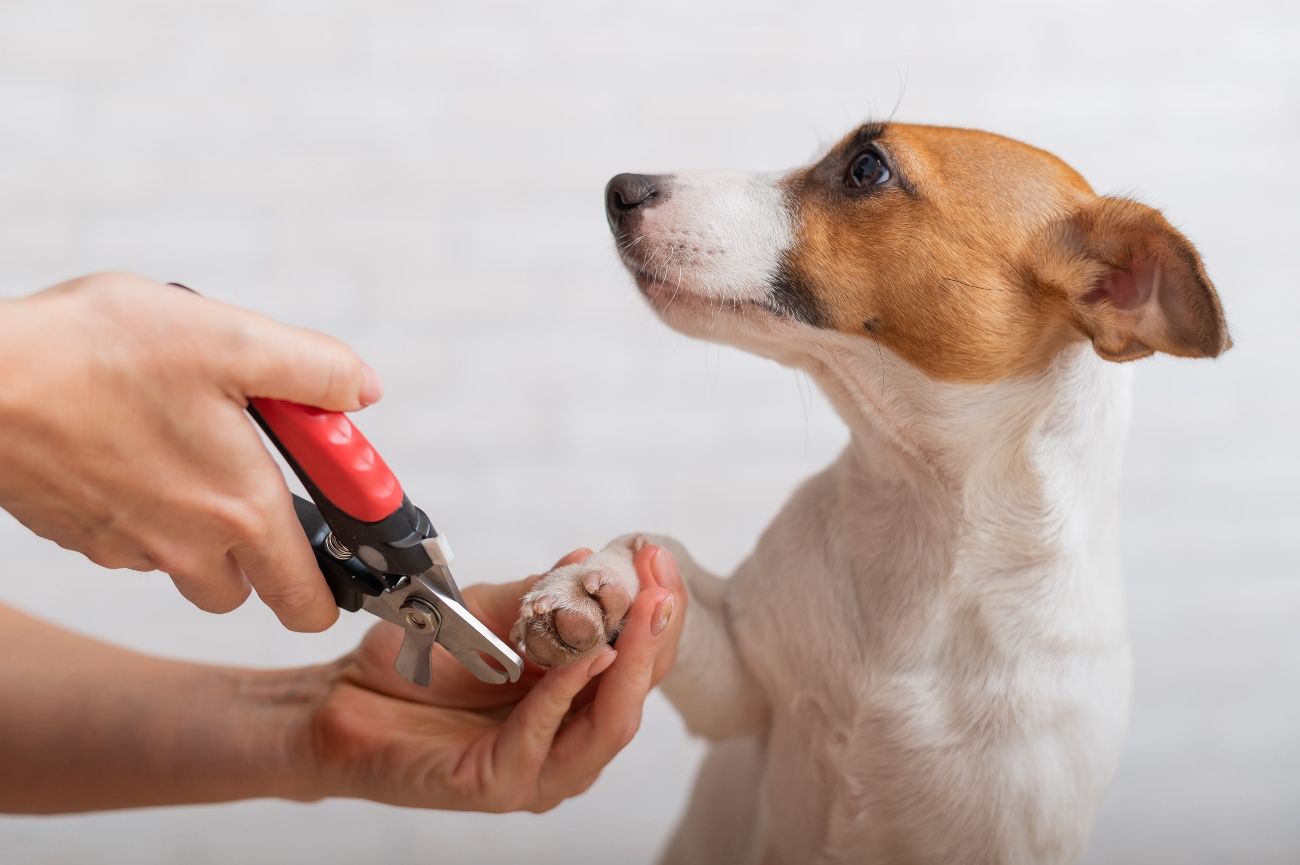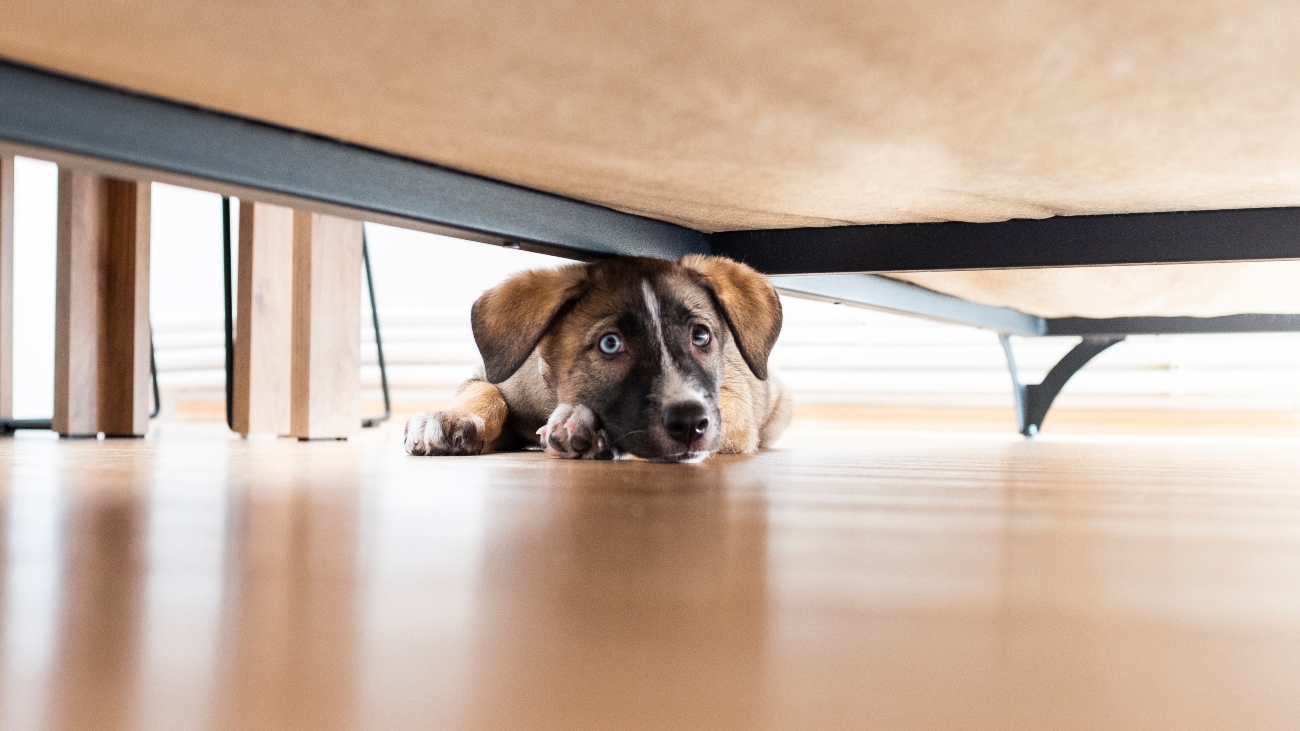Why is my dog biting their nails? A guide to understand and address the issue
8th November, 2023

As a pet owner, you might have noticed your furry friend frequently nibbling on their nails. If you've been wondering, "Why is my dog biting their nails?" - you've come to the right place. This behaviour might seem odd, but it's usually a sign that something is bothering your dog.
Understanding the causes behind your dog's nail-biting tendencies can help you address the issue effectively and ensure your pet's comfort and wellbeing. Understanding why a dog chews their nails can be puzzling and frustrating.
However, it's essential to approach the issue with patience and knowledge. The reasons can be varied, from medical conditions to behavioural issues. Let's delve into the most common causes and how you can help.
Overgrown nails
One of the most common reasons why my dog chews their nails is due to overgrown nails. If your dog's nails are too long, they can cause discomfort or pain while walking or running.
Overly long nails can exert pressure on the paw pad, leading to discomfort, and, in severe cases, they might even start to curl and dig into your pet's skin, causing pain and potentially leading to skin infections.
Regular nail trimming is a crucial part of pet grooming. If your dog's nails are click-clacking on the floor as they move around, it's a sign that they're too long and need a trim.
Remember, if you're not comfortable trimming your dog's nails yourself, you can always take them to a professional groomer or a vet.
Allergies
Allergies can lead to itchy skin around your pet's paws and nails, provoking nail chewing.
- Your pet could be allergic to environmental factors like pollen, dust, or grass.
- Food sensitivities can also be the culprit, causing itchiness around the nail beds.
- Allergies can cause a condition known as atopic dermatitis, which can affect the whole dog's body or just specific areas, often the paws and front legs.
If your dog is showing signs of allergies, such as constant biting and chewing at their paws or nails or redness and inflammation, it's important to consult with a vet. They can help identify the allergen causing the discomfort and suggest suitable treatment options.
Parasitic infections
Parasites can also be a reason why your dog might be chewing their nails. Various parasites, like fleas and ticks, can infest your dog's skin, causing itching and discomfort.
Fleas, in particular, can even cause a condition known as flea dermatitis, characterised by red, itchy skin.
If you spot unwanted pests on your pet or notice symptoms such as redness, swelling, or excessive scratching and biting at their paws and nails, it's best to consult a vet immediately.
They can provide appropriate treatment and preventive measures to control these pesky parasites.
Nail or claw injuries
Injuries to the nails or claws are another common cause of nail biting in dogs. Accidents, normal activity like digging, or even catching the claw on carpets can result in nail injury, leading to discomfort and pain. Dogs, in response to the discomfort, might start to chew or bite their nails.
A dog that's excessively biting and chewing at their nails is trying to send you a message that something's not quite right. If your dog starts limping or shows signs of distress in conjunction with nail biting, it's time to take them to a vet.
Claw diseases and medical conditions
Certain medical conditions can cause your dog to pay excessive attention to their claws and toes. Diseases affecting the claws, known as onychopathies, can result in abnormal nail growth, inflammation, or softening and splitting of the nails.
Some diseases, such as symmetric lupoid onychodystrophy (SLO), specifically target the claws, causing discomfort and potentially leading to your dog chewing their nails.
In addition, systemic conditions like hypothyroidism, diabetes, or vasculitis can also lead to nail problems. If you suspect that a medical condition could be the reason behind your pet's nail biting, a visit to the vet is essential to diagnose and treat the underlying issue.
Fungal and bacterial infections
Bacterial or fungal infections can also be responsible for your dog's nail-biting habit. Fungal infections often affect one or two nails, leading to rough, sandpaper-like nails, or abnormally soft nails. Bacterial infections, on the other hand, are characterised by swollen, oozing, and fractured claws.
Infections can be secondary to another condition or trauma. If you notice any of these symptoms in your pet, it's crucial to get them examined by a vet. They can prescribe suitable antibiotics or antifungals to treat the infection and provide relief to your pet.
Anxiety and boredom
Just like humans, dogs can resort to nail-biting during times of stress or anxiety. Separation anxiety, confinement, or phobias can all result in self-trauma behaviours, including biting nails.
Similarly, boredom can also lead your dog to developing biting behaviour. If your dog does not get enough mental and physical stimulation, they might start chewing their nails to pass the time.
If you notice your pet engaging in nail chewing during periods of stress or when they're left alone for long periods, consider providing them with toys or activities to keep them occupied.
If the dog's anxiety is severe, consulting with a vet or a professional dog trainer might be necessary to implement suitable behaviour modification techniques or to approve the use of anxiety medication.
Compulsive disorders
In some cases, chronic nail biting in dogs can be indicative of an obsessive compulsive disorder. These are repetitive and excessive behaviours that often indicate a dog who is overly anxious or frustrated. Changes in the environment, loss of a companion, or lack of socialisation can trigger compulsive behaviours in dogs.
If you suspect that your dog's nail biting is a compulsive behaviour, it's advisable to seek professional help. A vet or a certified animal behaviourist can provide guidance and treatment options, including behaviour modification techniques and, in some cases, medication.
Presence of foreign objects
Sometimes, the cause of your dog's nail biting could be as simple as a foreign object stuck in their paw or around the nail. Blades of grass, small stones, or other debris can easily get lodged in your dog's paw, causing discomfort and prompting them to bite their nails.
Regularly checking your dog's paws and cleaning them can help prevent this issue.
Skin conditions
Skin conditions like dermatitis or mange can cause itching and discomfort, leading your dog to bite their nails. These conditions often result in possible scabs, redness, swelling, and sometimes even hair loss around the affected area.
If you suspect that your dog has a skin condition, it's best to schedule a visit with your vet. They can diagnose the condition and provide appropriate treatment to alleviate your pet's discomfort.
Is it normal for a dog to chew their nails?
While it might seem strange to us humans, the question "Is it normal for a dog to chew their nails?" comes up quite often among pet owners.
Dogs can indulge in this behaviour for a variety of reasons, including boredom, anxiety, or even due to a medical issue like allergies or a skin condition.
However, if your furry friend is constantly nibbling at their paws, it's best to consult with a vet.
Excessive chewing can lead to painful sores and infections. So while occasional nail chewing isn't necessarily abnormal, it's important to ensure it's not indicative of an underlying health problem.
How do I get my dog to stop chewing their nails?

Identify the cause
The first step to stop your dog from chewing their nails is to identify the cause. It could be due to:
- Anxiety
- Boredom
- Allergies
- An underlying medical condition
If it's recent behaviour, you should consult with a vet to rule out any medical issues. For example, if your dog has started to chew their nails after a change in their environment, like a move or a new family member, it could be due to stress or anxiety.
Provide distraction
Dogs often chew their nails out of boredom. Keep your dog mentally and physically stimulated with regular exercise, interactive toys, and puzzle feeders. A Kong toy filled with peanut butter can provide a long-lasting distraction for your dog.
Trim nails regularly
Regular nail trimming can help prevent your dog from chewing their nails. If nails are kept short and neat, your pup may be less likely to chew on them.
Consider getting your dog's nails professionally trimmed at a groomer if you're uncomfortable doing it yourself.
Use anti-chew sprays
There are several safe and non-toxic anti-chew sprays available on the market. These sprays have a bitter taste that discourages dogs from chewing. Grannick's Bitter Apple
Spray is a popular anti-chew spray that can be applied to your dog's nails.
Train and reward
Train your dog to stop chewing their nails by using positive reinforcement techniques. Whenever your dog stops chewing their nails on command, reward them with treats or affection.
If you notice your dog starting to chew their nails, redirect their attention with a toy. If they stop and play with the toy, reward them.
Anxiety relief
If your dog's nail chewing is due to anxiety, consider implementing calming techniques such as massage, soothing music, or even doggy anxiety wraps.
A Thundershirt is an anxiety wrap for dogs that can help soothe their nerves and reduce unwanted behaviours like chewing.
Seek professional help
If you've tried various strategies and your dog continues to chew their nails, it may be best to seek professional help.
A word on insurance
While understanding and addressing your dog's nail biting is important for their comfort and wellbeing, it's also essential to consider the potential costs associated with veterinary care.
Dog insurance can help cover the costs of veterinary treatment for accidents and illnesses, making it easier for you to provide your pet with the necessary care without worrying about the financial aspect.
You can get a dog insurance quote for your furry friend through our website or get in touch with our dog insurance team at 0330 102 5748.
Final thoughts

Understanding "why is my dog biting their nails" is the first step towards resolving the issue and ensuring your pet's comfort. Nail biting in dogs is usually a sign of discomfort and shouldn't be ignored, especially if it's a chronic behaviour.
While this guide provides a comprehensive overview of the possible causes, it's always advisable to consult with a vet if you're concerned about your pet's behaviour.
They can provide a proper diagnosis and treatment plan tailored to your dog's specific needs.
Helpful Pages
Recent Posts
Pet Insurance Quote
- 98% claims paid *
- Claims paid directly to vets
- 24/7 vet video consultations
- Interest free monthly payments




